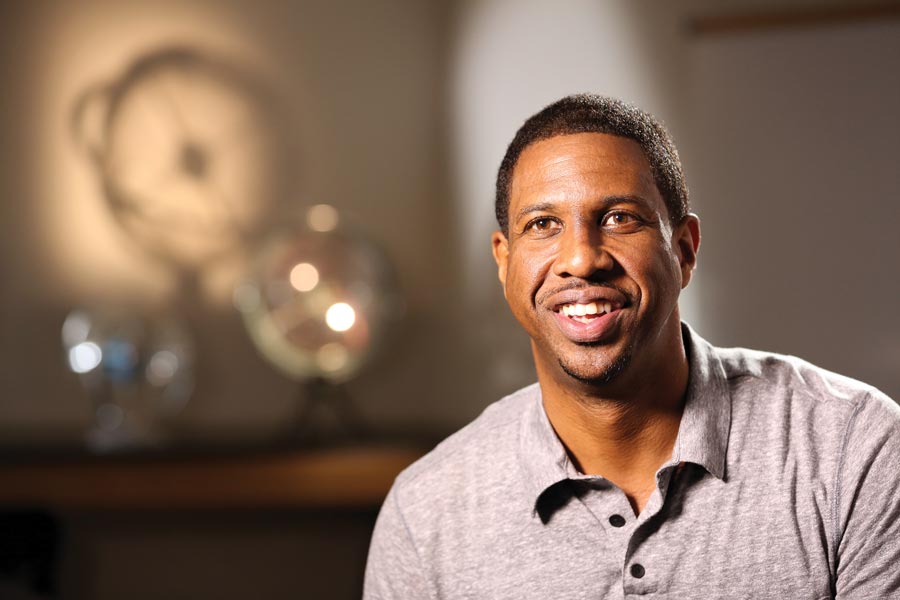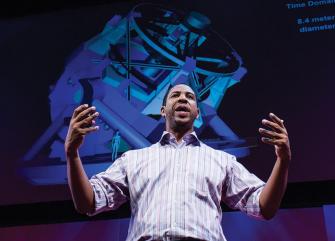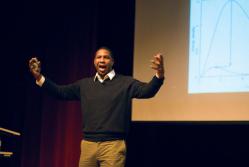Thinking Outside the "Box"
Fall
2014
Pathways - Advice from Experienced Voices
Thinking Outside the "Box"
A Journey from Thug to Theoretical Physicist
By:Hakeem Muata Oluseyi, Associate Professor
Florida Institute of Technology

When I look around America, I see thought bubbles. People have stories in their minds about other people, these stereotypes. If you’re not careful, these stories can trap you. Don’t let that happen.
Today I’m a professor. I’ve made important discoveries in solar physics and published important work in cosmology. I’ve worked in Silicon Valley, where I invented a new kind of transistor. I hold a bunch of patents and am a TV personality on shows such as Outrageous Acts of Science and Alien Encounters.
You might find this hard to believe if you knew about my childhood. My mom worked all the time, and we didn’t have much money. We moved almost every year growing up, so I was always the new kid in the bad neighborhood. There were a lot of people who wanted to prey on me. I was fighting and running a gauntlet every day just to get to school. When I was 7 years old and living in LA I had male cousins who were in the Crips gang. So I started saying I was a Crip and stealing.
At the same time I had a set of World Book Encyclopedias that I literally read from A to Z. I was identified as gifted. That was the story of my life back then—academically talented, always in trouble.
For much of my life I acted out what I thought my role was, based on what society told me. I was always hearing sentences that start with “Black folks don’t. . . .,” as in, “Black folks don’t play golf” or “Black folks don’t swim.” Well, what about “Black folks don’t do science”?
When my mom and I eventually moved to rural Mississippi—to a trailer on a dirt road off a dirt road off a dirt road—some professors from a nearby university came to my high school and told us about a science fair. The personal computer had just come out, and my girlfriend’s family had one. I taught myself BASIC and coded the effects of special relativity. I ended up winning first place in physics at the science fair.
Looking back on it, those judges must have been so surprised to see this little black kid from an all-black community talking about relativity and coding. Don’t get caught in that little black box of who people think you should be. Don’t get caught in any box.
I learned this lesson the hard way. I dropped out of Tougaloo College in Mississippi, which was the beginning of a spiral into deep darkness for me. There were a lot of drugs, a lot of guns. Then I was working as a janitor, and there was an opening for a bellhop that I applied for. I didn’t get it. My exact thought at that moment was, “I can’t even move up from janitor to bellhop? I’m going back to college.” To learn math I spent every night at a chalkboard in the science building. I did every problem in the calculus book. I ended up double majoring in math and physics at Tougaloo.
At one point my chemistry professor put my name in for a summer research program at the University of Georgia without telling me, and I was selected. I couldn’t pay for the plane flight to Athens, GA; I was sleeping in a dorm I broke into because I didn’t have money for housing. He bought my ticket.

That summer was a life-changing experience for me. In Mississippi racism had tainted every job I had. I didn’t detect any of that in research. This was the life for me!
The secret is to jump on every opportunity that comes your way, every moment of serendipity. While I was in college, students from Harvard and MIT came by and told us about a national conference for black physicists. I went to the conference, and they told me, “Here are the top graduate schools. Here’s what you need to do to get in. Here are the recruiters.” I got to know the recruiters and applied to graduate school; I was accepted at almost every school where I knew someone.
Don’t listen to people who try to stop you from doing what you want to do. While I was a graduate student at Stanford, I learned about classism—even being white wasn’t good enough if you didn’t talk right and dress right. I wanted to run back to the ghetto. One professor tried to get me kicked out. But I learned how to interact with a new social class. I got mostly A’s in my graduate courses. My PhD work won a national award.
In the end I listened to the people who wanted to support me. I decided to change my life and change my name. My new first name, Hakeem, means “wisdom,” and my new middle name, Muata, is “He seeks the truth.” Oluseyi comes from the West African Yoruba people, and it means “God has done this.” //
Project Physics

Oluseyi has appeared on TV shows and given talks at various venues, including the popular TED conferences. To learn more about his scientific interests and life story, check out these videos and interviews:
- Find out how he scrutinizes the science presented in the Science Channel show Outrageous Acts of Science at www.youtube.com/watch?v=oWMqhDdSN0o.
- See him connect the concept of infinity to the choices we make in a TEDx lecture for inmates at a state prison at www.youtube.com/watch?v=45pTq0ADz6o.
- Learn what we know about the big bang in his TEDxOrlando lecture at www.youtube.com/watch?v=wiNnhJZf6Ys.
-
Read more about his life in this profile published on TEDBlog at http://blog.ted.com/2012/10/05/rise-of-a-gangsta-nerd-fellows-friday-wit....
-
Explore sonic booms and asteroids on a video hosted by the TEDBlog at http://blog.ted.com/2013/02/18/ted-fellow-hakeem-oluseyi-talk-sonic-boom....
-
You can also follow Oluseyi on Twitter (@HakeemOluseyi) or Facebook at www.facebook.com/hakeemoluseyi.
